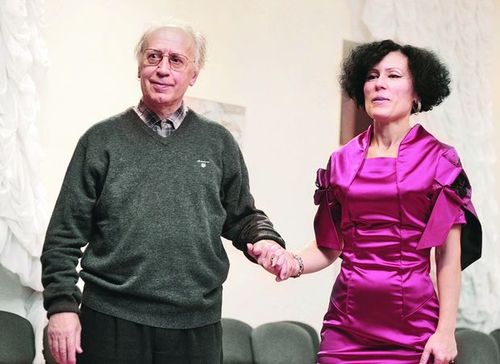A bright pastoral
The Festival of New Music at the 4th Book Arsenal hosted the premiere of Valentyn Sylvestrov’s song cycle Chants, with lyrics taken from poems by Taras Shevchenko
The Arsenal’s hall features high arches, brick walls, and towering columns. When the Kyiv Chamber Choir, conducted by Mykola Hobdich, enchanted the audience by its impeccable a capella singing as it performed Chants, we kept feeling like we were in an ancient temple. Because a temple is a community of well-meaning people, it did happen that way, and the Bard of Ukraine was with us.
“I placed The Wide Dnipro Roars and Moans, part of a triptych I have composed earlier, at the beginning of the cycle,” Valentyn Sylvestrov told us, “to emphasize what time we are now living through, and reflect Ukrainian people’s anger at the Kremlin occupiers. The cycle includes elegy The Days Pass, the Nights Pass..., pastoral The Cherry Orchard by the House, psalm I Put All My Hope... and evening song My Evening Star. Why have I chosen this combination, involving a sad elegy and a bright pastoral? Taras Shevchenko was, of course, a freedom fighter, he even wrote some theomachist poems, although he was a deeply religious man. But he concerned himself with more than just social problems, as being a gentle, subtle lyricist, he deeply felt about the most important question of one’s worldview: how should a human being live in this world. That fragment from the poem Mary is a true prayer in which the poet expressed his hopes for the Mother of God’s mercy and promised her: ‘And I, good-natured, will sing about prosperous villages that had been poor...’”
Flowering trees mentions link the first and second parts of the concert: singer Inna Halatenko and pianist Oleh Bezborodko, performing songs based on poems by the classic world poets, began their performance with pastoral The Cherry Orchard by the House, and the text that had inspired the composer to create a new tune sounded movingly and tenderly when performed solo. Halatenko’s wonderful soprano timbre has so many crystal clear shades that lyrical masterpieces by Shevchenko, Pavlo Tychyna, Lesia Ukrainka, Paul Celan, Afanasy Fet, and Mikhail Lermontov are made alive again at the moment of singing. Bezborodko’s part is not accompaniment in the usual sense, but a permanent relationship when the dialog of voice and piano allows tunes to merge, and in the final, it looks like the pianist completes the singer’s solo performance. The duo managed to convey the incredible expression contained in Sylvestrov’s quiet music as a sonorous string of sense.
The concert is a joint project set up by the organizer of the festival, Ukho Music Agency, and Dukh i Litera Publishers. The publishing house’s director Kostiantyn Sihov spoke about the new edition of the Ukrainian translation of Meetings with Sylvestrov, supplemented by Bagatelle DVD anthology, including 21 discs of music recorded in the past decade and performed by the composer himself. Sihov also introduced the guest of the evening, George Nivat from Switzerland, a famous Slavist, literary historian, and honorary professor of many European universities. The scholar came to Kyiv to take part in the seminar “Resistance to the Communist Regime: The Experience of the Dissident Movement” held within the European Forum, a joint project of the Diplomatic Academy of Ukraine and Dukh i Litera Publishers. He took part in the roundtable discussion “Literature and Borders” at the Book Arsenal and then lectured in Kharkiv. After the concert, Nivat said he was happy to listen to the music of Sylvestrov and thanked its participants for a very high level of performance.
By the way, the composer’s Eighth Symphony should have premiered in the Grand Hall of the Moscow Conservatory, conducted by famous Vladimir Yurovsky, but Sylvestrov has refused to let his music to be performed in Russia after the annexation of Crimea and canceled the scheduled concert. Thus, the maestro teaches us courage by his music and actions alike. Beyond that, he teaches us, in the words of Shevchenko, “to live by one’s heart and to love people.”






